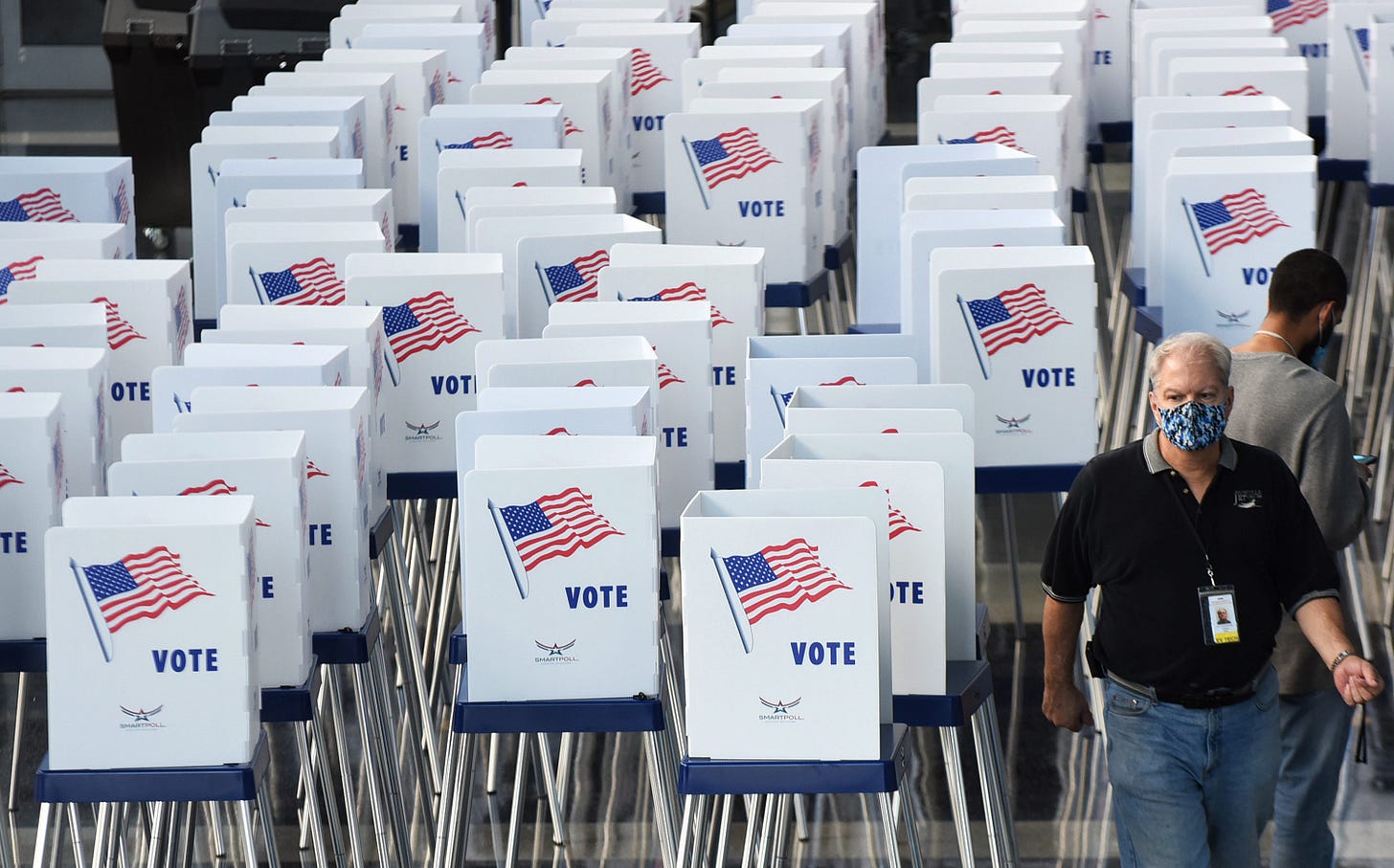Too Much Democracy Is Killing Democracy
Highly differentiated parties and massive voter mobilization might not be as good for democracy as was once thought.

Not too long ago, political scientists were concerned about the “hollowing out” of Western democracies. In the United States, voter turnout in presidential election was in a steady decline for over three decades after 1960, as the Democratic and Republican platforms were almost indistinguishable and voters were apathetic. In Europe, the late Irish political scientist Peter Mair warned in his 2013 book that “neo-liberal” technocracy ruled, resulting in shrinking turnout and party membership, and demoralized partisans.
Recent years have put such concerns to rest. Not only do elections seem consequential again, but often existentially so. Numerous complaints can be made about partisanship in the United States, but not that either side lacks enthusiasm or energy—or that the two sides share an identical policy outlook. Indeed, a candidate and a political party with real or imagined penchants for voter suppression helped mobilize voter turnout to the highest level in over a century and, moreover, received the second-highest number of votes in the history of U.S. presidential elections.
Whether or not those who care about political participation want to make Donald Trump and other populist figures champions of their cause is irrelevant. What matters is that the price of this un-hollowing has been far too steep, making compromise impossible and turning every election into a perceived “Flight 93” event.
In fact, evidence from around the world is ambiguous about whether massive political participation is a blessing—and, conversely, whether “hollowing out” is necessarily a curse. Viktor Orbán’s takeover in Hungary 2010, facilitated by a deep financial crisis, led to significant backsliding: a partisan rewriting of the country’s constitution, gerrymandering, court-packing, and crackdowns on civil society. Yet, what Orbán’s critics sometimes miss is that his arrival in power came on the back of extremely high levels of citizen participation and engagement in elections, protests, or activism.
In comparison, Baltic states also suffered greatly from the same financial shock—in 2009 their GDP fell by over 14 percent. Yet, as a 2015 paper by the Hungarian political scientist Béla Greskovits shows, one difference between Hungary and the Baltic democracies was that the latter had been “hollowed out” by the time the crisis hit.
As a result, there was relatively little popular resistance to bold and effective fiscal and structural reforms to address the fallout of the crisis. Those included drastic wage and employment cuts across the public sector. Instead of bitter partisan fights and an ascent of budding authoritarians to power, the Balts took their bitter technocratic medicine, quickly recovered, and moved on. In contrast, the political turmoil in Hungary ushered in a highly unorthodox mix of economic policies, including the seizing of assets of private pension funds and targeted levies on large, foreign-owned businesses, arguably slowing down the recovery—not to mention the lasting political changes enacted by Orbán.
It seems uncontroversial that better informed citizenries tend to reach better decisions over politicians and policy platforms. Boosts to political participation driven by rising polarization and the presence of divisive personalities are not unalloyed goods if they bring low-information non-voters to the polls. The more national politics is treated as a mass spectator sport, the harder it is for anyone to ignore it. In Hungary, for example, the highly engaged citizenry at the time of Orbán’s rise to power was simply a result of an extreme rise of partisan polarization during the 2000s. Likewise, in the United States, rising polarization—first among political elites, then among the public—has been slowing pushing turnout back up.
Earnest conspiracy theorists might have once believed that elections did not matter and that all important decisions were made by lizard people. Political candidates like Marjorie Taylor Greene help them reconsider their political disengagement. Or, as Wisconsin Senator Ron Johnson put it, Republican legislators have had no choice but to go along with the president’s conspiracies and irresponsible behavior simply because of the “massive amounts of people Donald Trump brought into the party, many of whom have never cared about politics before.”
Needless to say, there are good reasons to doubt that this boost to political participation will have salutary effects on policy outcomes or on the health of America’s body politic.
Not of this should be read as a reason for restricting the right to vote or necessarily for “epistocratic” reforms (in which the votes of more knowledgeable citizens are given extra weight) advocated by Garett Jones or Jason Brennan. There is a great deal of value in making sure that all citizens have the option of political participation if they so choose, without having to face arbitrary or excessive hurdles.
Yet, it is an argument for a political, social, and cultural compact that makes participation by many unnecessary, in their own eyes. A more boring politics, populated by forgettable yet basically competent figures instead of fame-craving clowns and provocateurs would be a great place to start.


